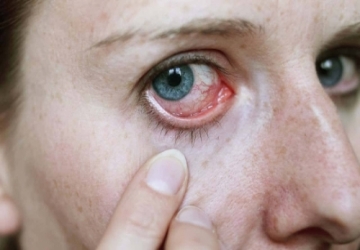
Eye allergy is a condition that affects the eyes as a reaction, when the eye is exposed to one of the allergens and stimuli, such as dust, pollen or smoke.
And with the question of Dr. Muhammad Hantira, an honorary assistant professor, ophthalmology department, Umm Al-Qura University, Saudi Arabia
Explain that: -
An allergic reaction results from a kind of misunderstanding by the body’s immune system, usually the immune system attacks bacteria, viruses and pathogens, but in cases of people with allergies, it may mistakenly attack the allergens, believing that they are pathogenic bacteria or viruses or dangerous substances.
What happens here is that the body begins to attack allergens by releasing histamine that causes unpleasant symptoms, such as: coughing, sneezing, tears, and a runny nose.
Types of eye allergy and their symptoms
Dr. Hanatera indicated that there are several types of eye allergy, and these are some of them with the symptoms associated with each of them:
• Seasonal allergies and allergic conjunctivitis
Seasonal eye allergy (as its name indicates) appears only at certain times of the year, and it is the most common type of eye allergy, and these symptoms that appear on the eyes when infected:
- Burning sensation.
- Itch.
- -Redness
- -Excessive secretion of tears.
- -Swelling of the eyelids and eye contour.
- -Dark circles.
- -Runny nose.
- -Nasal congestion.
• As for allergic conjunctivitis, this does not depend on a specific time, and it comes with symptoms similar to the above, but less severe.
• venous keratitis
This type of eye allergy is more dangerous than the previous two types, as there is no specific season for it, but its symptoms worsen dramatically in certain seasons of the year, and if left untreated, it may cause blindness.
Especially this type of eye allergy most often affects men and people with asthma or eczema, and its apparent symptoms include:
- -Itchy, troublesome eye area.
- -Excessive secretion of tears and thick phlegm.
- -Sensitivity to light sources.
- -Feeling of a foreign object inside the eye.
• Contact conjunctivitis
This type of eye allergy is caused by the sensitivity of the eye to contact lenses or a certain type of protein found in the eye, and these are the most important symptoms of contact conjunctivitis that appear on the eyes and nose:
- -Redness and itching.
- -Thick phlegm
- -Eye lens discomfort.
• Giant papillary conjunctivitis
This type of eye allergy is usually associated with wearing contact lenses, and it is a very severe type, as the patient has fluid-filled bags and blisters in the lining of the eyelid from the inside. These are some of the accompanying symptoms:
- -Itchy, swollen eyes.
- -Tears
- -Feeling of a foreign object inside the eye.
- -Thick phlegm
- -Blurry vision.
- -Feeling of discomfort when trying to wear contact lenses.
Causes of eye sensitivity
There are many causes and factors that stimulate eye allergy, and these are the most important of them:
• Infection with certain diseases. Eye sensitivity often appears in people who already have diseases such as eczema and hay fever.
• Exposure to one of the allergens and stimuli (Allergens), such as: pollen, mold, dampness, smoke, and dust.
• Use make-up that contains allergens.
• Taking inappropriate medicines that may cause an allergic reaction.
• In rare cases, food allergy may cause eye sensitivity.